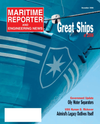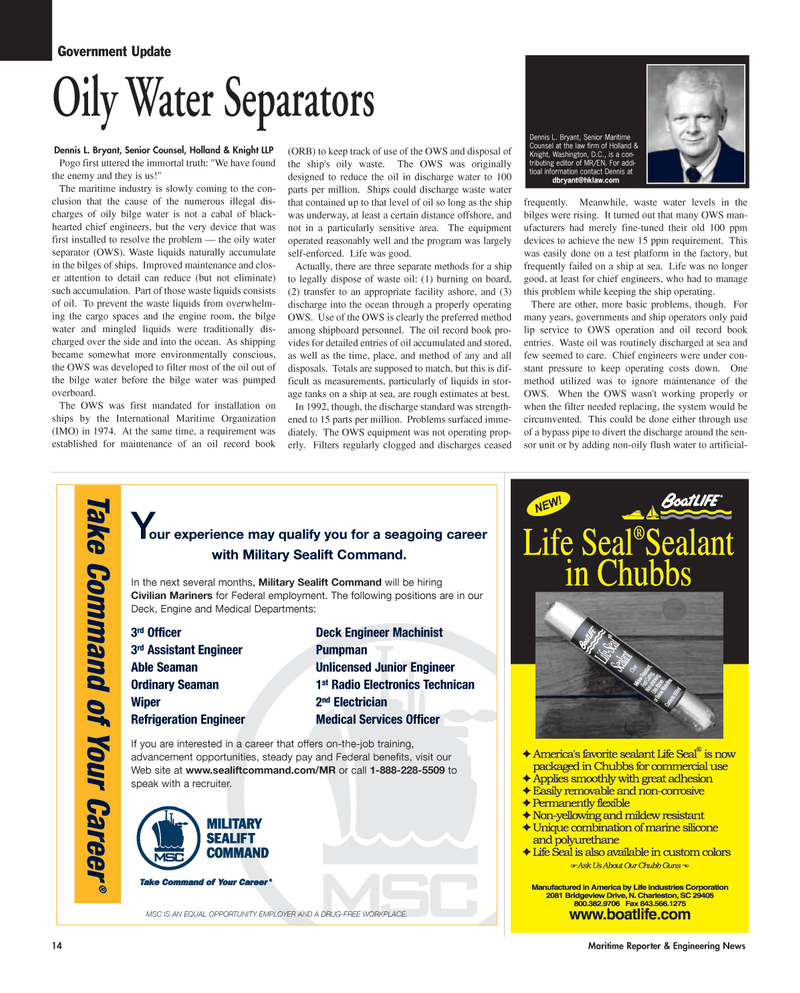
Page 14: of Maritime Reporter Magazine (December 2, 2006)
Read this page in Pdf, Flash or Html5 edition of December 2, 2006 Maritime Reporter Magazine
14 Maritime Reporter & Engineering News
Dennis L. Bryant, Senior Counsel, Holland & Knight LLP
Pogo first uttered the immortal truth: "We have found the enemy and they is us!"
The maritime industry is slowly coming to the con- clusion that the cause of the numerous illegal dis- charges of oily bilge water is not a cabal of black- hearted chief engineers, but the very device that was first installed to resolve the problem — the oily water separator (OWS). Waste liquids naturally accumulate in the bilges of ships. Improved maintenance and clos- er attention to detail can reduce (but not eliminate) such accumulation. Part of those waste liquids consists of oil. To prevent the waste liquids from overwhelm- ing the cargo spaces and the engine room, the bilge water and mingled liquids were traditionally dis- charged over the side and into the ocean. As shipping became somewhat more environmentally conscious, the OWS was developed to filter most of the oil out of the bilge water before the bilge water was pumped overboard.
The OWS was first mandated for installation on ships by the International Maritime Organization (IMO) in 1974. At the same time, a requirement was established for maintenance of an oil record book (ORB) to keep track of use of the OWS and disposal of the ship's oily waste. The OWS was originally designed to reduce the oil in discharge water to 100 parts per million. Ships could discharge waste water that contained up to that level of oil so long as the ship was underway, at least a certain distance offshore, and not in a particularly sensitive area. The equipment operated reasonably well and the program was largely self-enforced. Life was good.
Actually, there are three separate methods for a ship to legally dispose of waste oil: (1) burning on board, (2) transfer to an appropriate facility ashore, and (3) discharge into the ocean through a properly operating
OWS. Use of the OWS is clearly the preferred method among shipboard personnel. The oil record book pro- vides for detailed entries of oil accumulated and stored, as well as the time, place, and method of any and all disposals. Totals are supposed to match, but this is dif- ficult as measurements, particularly of liquids in stor- age tanks on a ship at sea, are rough estimates at best.
In 1992, though, the discharge standard was strength- ened to 15 parts per million. Problems surfaced imme- diately. The OWS equipment was not operating prop- erly. Filters regularly clogged and discharges ceased frequently. Meanwhile, waste water levels in the bilges were rising. It turned out that many OWS man- ufacturers had merely fine-tuned their old 100 ppm devices to achieve the new 15 ppm requirement. This was easily done on a test platform in the factory, but frequently failed on a ship at sea. Life was no longer good, at least for chief engineers, who had to manage this problem while keeping the ship operating.
There are other, more basic problems, though. For many years, governments and ship operators only paid lip service to OWS operation and oil record book entries. Waste oil was routinely discharged at sea and few seemed to care. Chief engineers were under con- stant pressure to keep operating costs down. One method utilized was to ignore maintenance of the
OWS. When the OWS wasn't working properly or when the filter needed replacing, the system would be circumvented. This could be done either through use of a bypass pipe to divert the discharge around the sen- sor unit or by adding non-oily flush water to artificial-
MSC IS AN EQUAL OPPORTUNITY EMPLOYER AND A DRUG-FREE WORKPLACE.
T ak e Command of Y our Car eer ®
Your experience may qualify you for a seagoing career with Military Sealift Command.
In the next several months, Military Sealift Command will be hiring
Civilian Mariners for Federal employment. The following positions are in our
Deck, Engine and Medical Departments: 3 rd Officer Deck Engineer Machinist 3 rd Assistant Engineer Pumpman
Able Seaman Unlicensed Junior Engineer
Ordinary Seaman 1 st Radio Electronics Technican
Wiper 2 nd Electrician
Refrigeration Engineer Medical Services Officer
If you are interested in a career that offers on-the-job training, advancement opportunities, steady pay and Federal benefits, visit our
Web site at www.sealiftcommand.com/MR or call 1-888-228-5509 to speak with a recruiter.
Government Update
Oily Water Separators
Dennis L. Bryant, Senior Maritime
Counsel at the law firm of Holland &
Knight, Washington, D.C., is a con- tributing editor of MR/EN. For addi- tioal information contact Dennis at [email protected]
MR DECEMBER2006 #2 (9-16).qxd 12/5/2006 12:56 PM Page 14

 13
13

 15
15
